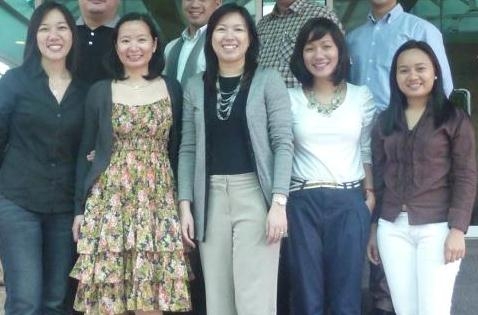Women in the Philippines: Inspiring and Empowered

Here in Asia Society Philippines, positions are held mostly by women. This is somehow an affirmation of the 'women-friendly' societal conditions of the country. Although this is only a small portion of a large and competitive professional community, reflections of the nation's recognition of the role and importance of women are evident on aspects such as justice, education, economics, politics and health. The last is still a debatable topic, with the current issue of the Reproductive Health Bill in the Philippine Congress. Nevertheless, the country has evolved from depicting women as only subservient and modest individuals to powerful nation builders and leaders. It would be an understatement that this could all be attributed to the efforts of the government, but it could not be denied that a democratic state stamped the gateway of the formalization of women protection through the Constitution and its supporting statutes.
Justice. This is characterized, according to Newsweek, by 'laws protecting women from domestic violence, adolescent marriage and marital rape, and also women’s access to land and bank loans'. The Philippines has a handful of legislations that address the problems of abuse and violence against women. One of these is Republic Act No. 9262, known as the "Anti-Violence Against Women and Their Children Act of 2004", that provides the penalties for such offenses. The 'Anti-Rape Law of 1997' is also a good example. One of its key components is the concept of 'marital rape', which protects married women from sexual abuse by their husbands. In short, the Philippines has, not enough but, ample number of laws that ensure the protection of women. There is still a need to solidify policies for prostitution, cyber and media exploitation of women, but this does not mean that no such laws exists to protect them. The challenge is to effectively improve and implement them.
Education. This is probably one of the areas that women have excelled on in the Philippines. Education has been, for a long time, open to all gender since the American Thomasites have started their academic institutions, which the Spanish tradition of primarily accepting male students. Not only are the girls in this contemporary period enjoy equality but also outshines their biological counterparts. According to the National Statistics Office of the Philippines (as of 2003), the basic and functional literacies of women in the country are 90.4% and 86.3% compared to the 80.6% and 81.9% of that of the males. This does not imply a somehow 'battle of the sexes', but shows that the Philippines hosts a sphere of gender equality for a healthy academic competition.
Economics. Business and industries are still male-dominated fields, but this does not mean that the women in the Philippines are just on the sidelines. Females in business are actually on the rise. Some companies in the Philippines actually prefer to hire females due to their consistent work ethic and professionalism. There are also top female business executives, like members of the Asia Society Philippines' Board of Trustees: Ms. Tessie Sy-Coson and Ms. Doris Magsaysay-Hoy. The former is a 'retail royalty'. She is the vice-chairman of SM Investments and hailed by the Fortune Magazine as one of the 50 Most Powerful Women in the World. The latter, on the other hand, is a 'shipping heiress'. She is the head of the Magsaysay Maritime, the largest manning company in the Philippines. A lot of women are now making their way up in the ladder of corporate bureaucracies. This is shift from the stereotype housewives to emerging group pf professionals.
Politics. Since the Commonwealth, Filipino women have been enjoying the right to suffrage and eligibility to public offices through the Act No. 4112, approved by then Pres. Manuel L. Quezon. Although men mostly hold public offices, women have likewise made their presence felt. It is the Philippines who produced the first female president in Asia-- Corazon C. Aquino. Former President Gloria Macapagal-Arroyo was its second. The Senate and the House of Representatives also have its women legislators, like Senators Miriam Defensor-Santiago, Pia Cayetano and Loren Legarda. The "Party-list System Act" also open doors for more awareness about the needs of women in the Lower House. Gabriela, a party-list group forwarding the interests of women, has consistently won a congressional seat in the past elections. The participation of women in Philippine governmental processes is predominantly a growing spectrum.
Health. This is probably, among the other aspects, the waterloo of the Philippines. In the Newsweek list, the country received only a 57.0 mark. This is relatively low compared to education, politics, justice and economics. This may be attributed to high death rates of women giving birth. The Reprodructive Health Bill is presently the most controversial topic in the country. WIth the country's deep Catholic faith, the whole nation, specifically the Congress, is divided whether this is beneficial to women or not, particularly. The future of this bill, if it will be promulgated into a law, is still unknown since debates are on-going.
Although the Philippines still has rooms for improvement in addressing issues concerning women, it is by-far a great place to become a woman. One of the best things that your country could probably give to you is the chance to aspire and create your own future without unfair limits. The Philippines could set an example to its Asian neighbors on how to move-on from traditional mindsets and accept that everyone deserves equal opportunities and treatment regardless of appearance, size, color, age and gender.
This post originally appeared on Asia Blog.